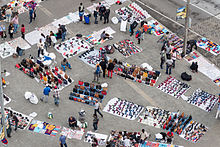Black market
A black market (also surreptitious trade or Austrian sometimes agiotage ) is understood to be an illegal part of the shadow economy .
Black markets typically arise where the state eliminates certain market factors (e.g. through price laws or rationing ) or prohibits entire markets. The black market is to be differentiated from the gray market , where trade takes place, which although not desired by regulatory policy, is not illegal.
Although a black market has some functionalities of the market (eg. Pricing , allocation , promotion of innovation ), but can not usually contribute to the overall wealth creation, since he rarely pensions generated - any operator because must expect that his government Takes advantage of the business, e.g. B. by collecting the goods. Business on a black market usually takes place in such a way that the mutual obligations can either be carried out quickly ( cash transactions step by step) or simply secured ( bargaining deposit ).
Although trade on the black market is not controlled, regulated or protected by the state, it does function according to the rules of the market. Black market prices therefore reflect the actual market price in the case of government-fixed prices or sales restrictions . Instead of state courts to settle disputes, other rules of conflict resolution usually apply in black markets, which are often manifested in informal structures based on factors such as reputation, trust and honor (see codes of honor ). Since the enforcement of the law cannot then take place through government agencies, phenomena of violence (“law of the strongest”) can arise.
Examples

After the Second World War , the supply situation for the population was very poor. Groceries and everyday goods were only legally available in shops in exchange for food stamps and in small quantities. In addition to this legal market, an illegal black market developed where everything was available, albeit at highly inflated prices or against payment in cigarettes ( cigarette currency ). Despite frequent raids by the police, it only disappeared after the currency reform in 1948 , when state regulations were abolished and market price formation was possible ("Suddenly the shops were full again").
Arms trade
Small arms are typical black market goods in Europe. Since the hurdles for the legal acquisition of such weapons are relatively high, a pronounced black market satisfies the demand. The international trade with small arms (small arms) is de facto incomplete regulated and therefore leaves room for the illizite distribution. The trade in war weapons is not prohibited without exception in most countries, but only requires state approval.
Cultural assets
In 2015 the Federal Ministry of Education launched “the project 'Procedure to illuminate the dark field as a basis for combating and preventing crime using the example of ancient cultural assets'”, which is “financed with 1.2 million euros for three years” and “reliable data on the functioning of the black market "Should determine. The impetus for this was the destruction of cultural assets in museums and excavation sites in Iraq and the statement: "The excavation pieces that the Islamic State (IS) does not destroy, it sells."
Alcohol and illegal drugs
Alcoholic beverages were black market items in the United States during Prohibition between 1920 and 1933 and are still today in countries where alcohol is considered an illegal drug.
Everyday goods
In some countries around the world, gasoline is a typical black market good when trade is regulated by the state through quantity or price restrictions. Even pornography , radar detectors and ivory can be black-market goods.
Currencies
In countries that do not allow free (private) currency trading, a black market for foreign currency regularly arises . For foreign providers of goods and services, the currencies of these countries are usually worthless, because these countries do not allow their currency to trade freely. This means that there is no adequate equivalent value for such a currency abroad. In these countries, imported goods are often only available in exchange for “hard” currencies (usually euros or US dollars ), which makes this foreign currency very popular. In such situations, there may be an unwanted outflow of foreign currency, so that these countries react with a compulsory exchange , import or export ban.
copyright
In regions of the world where violations of copyright, patent and exploitation rights are hardly punished by government agencies, blackmailing and copying of DVDs and CDs can be found at street vendors.
Services
Certain services are also often provided on a black market if they are considered illegal in the relevant country. Examples include: abortion , prostitution , smuggling , aiding and abetting tax evasion and helping to sell stolen goods ( receiving stolen goods ). The services and work performed in the form of illegal work are, however, legal as such.
Illegal immigrants are often affected by black markets in two ways: on the one hand, they cannot buy certain services on regular markets (e.g. their own transport to the destination country), on the other hand they often cannot and do not have to offer their labor in the destination country on the white labor market switch to illegal employment .
No black markets
The procurement of goods in the "shortage economy of the GDR " took place - contrary to popular opinion - not as a rule on black markets , but on gray markets , since non-commercial trade in own goods was allowed.
The sale of admission tickets (“black market tickets ”) between consumers also usually takes place on a gray market, since these transactions are usually not prohibited by law.
The black market in literature
With his short stories Lehmann or So nice was my market , Siegfried Lenz also created a literary monument to the black market in Hamburg and northern Germany after the Second World War.
Web links
Individual evidence
- ↑ : Rolf Brockschmidt: Propaganda with compressed air drill. In: Der Tagesspiegel. Berlin, March 2, 2015, p. 20.


